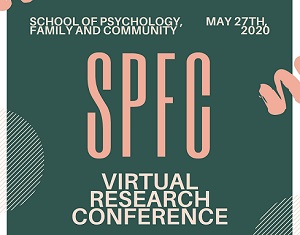Faculty-Student Collaboration
1
Faculty Sponsor(s)
Brittany Tausen, Ph.D.
Presentation Type
Event
Project Type
Completed quantitative research study
Primary Department
Psychology
Description
Outgroup members, such as individuals who are homeless are often dehumanized. While indirect contact (observing or learning about another person’s interaction with a member of a marginalized group) can reduce negative attitudes towards outgroup members, the conditions under which indirect contact is most (and least) likely to mitigate dehumanization have yet to be explored. In two studies, we investigated similarity as a boundary condition of indirect contact. Results indicated a significant effect of similarity when defined by university affiliation and interest in psychology (study 1), but not when defined by state of origin, political & religious identity (study 2). These conflicting findings indicate that some forms of similarity might be more impactful than others, or that the efficacy of indirect contact could be better explained by confounding variables (e.g., likability, warmth) not measured in the current studies.
Copyright Status
http://rightsstatements.org/vocab/InC/1.0/
Additional Rights Information
Copyright held by author(s).
Included in
Exploring social distance as a boundary condition of indirect contact
Outgroup members, such as individuals who are homeless are often dehumanized. While indirect contact (observing or learning about another person’s interaction with a member of a marginalized group) can reduce negative attitudes towards outgroup members, the conditions under which indirect contact is most (and least) likely to mitigate dehumanization have yet to be explored. In two studies, we investigated similarity as a boundary condition of indirect contact. Results indicated a significant effect of similarity when defined by university affiliation and interest in psychology (study 1), but not when defined by state of origin, political & religious identity (study 2). These conflicting findings indicate that some forms of similarity might be more impactful than others, or that the efficacy of indirect contact could be better explained by confounding variables (e.g., likability, warmth) not measured in the current studies.



Comments
This poster was also presented at WPA, San Francisco, 10/2020